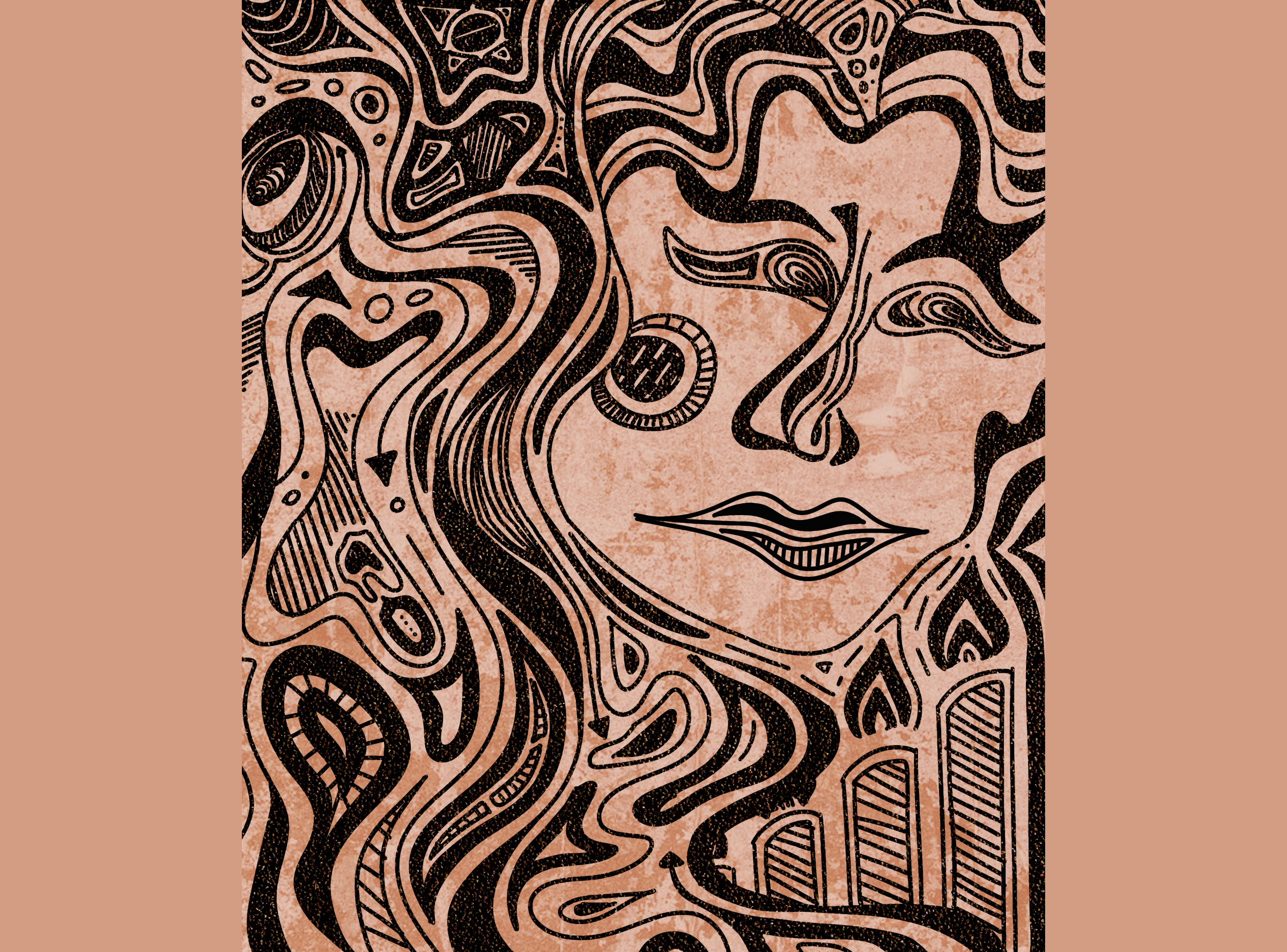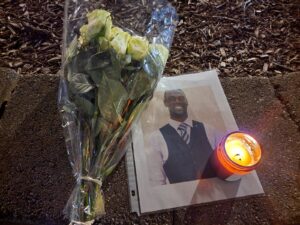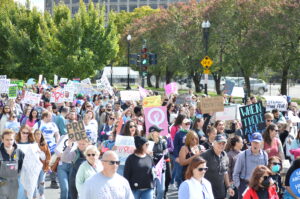On Sept. 23, Bahar Ghandehari (COL ’23) and other local Iranians in the District organized a vigil for Mahsa Amini on the Lincoln Memorial steps in solidarity with those protesting in Iran who have faced violent backlash from the Iranian government. Rallying cries of “Women, Life, Freedom!” and “Human Rights for Iran!” echoed the sentiments of a worldwide movement following the death of an innocent woman practicing her right to freely express herself.
Amini, a 22-year-old Kurdish woman, was arrested two weeks ago by the Iranian Guidance Patrol—colloquially known as Iran’s morality police—for not wearing her hijab in strict accordance with government laws. Many eyewitnesses reported that the police severely beat her upon arrest; suspicions further arose after her death. The police have listed her cause of death as heart failure while in custody, although her family has denied that Amini had preexisting heart conditions.
Many protestors blame the police, and the resulting activism has triggered some of the largest demonstrations in Iran since the 1979 Revolution. But these protests are about more than just Amini; women in Iran have faced—and mounted resistance against—discrimination and suppression over several decades, and are continuing to lead the fight for change.
The lack of clarity on the issue amidst an ongoing fight for women’s rights in Iran has galvanized world leaders and the Iranian diaspora, with protests occurring in D.C. and around the globe.
“It didn’t take a lot of preparation because everybody was just craving for an event, for something, for some sort of community in D.C. to come together after the horrific killing of Zhina,” Ghandehari—using Amini’s original Kurdish name—told the Voice.
Organizers set a table facing the Reflecting Pool with several candles. A large painting of Amini stood tableside, along with numerous posters and artwork of Amini and Iranian protestors. Hundreds gathered, some standing quietly and somberly, some crying, and some screaming for change.
“She was killed, beaten in the head. For a piece of cloth,” Ghandehari voiced in a speech at the vigil. “The past 40-plus years we have struggled, but today we are standing outside of Iran. We have to use the freedoms we have here. No matter how many they kill and arrest, we will not let them kill innocent people for nothing.”
While applause closed Ghandehari’s speech, the group’s demeanor signaled a stronger message. Chants like “Hey hey, ho ho, the Islamic Republic must go,” and “No justice, no peace in Iran” filled the air.
Ghandehari then invited her Afghan friend, Zahra Wakilzada (SFS ’24) to share a poem on the struggles of Afghan women, drawing a connection between oppressive Afghan life under Taliban rule and the current socio-political situation in Iran. “The struggle that Afghan women have to face with the Taliban and what Iranian women are facing with the Islamic Republic is the same, and it is important to make these connections,” Ghandehari added.
“The women of this region have fought enough,” Wakilzada said in her poem. One phrase resonated throughout: “Does the world see me?”
After the reading, the crowd broke into multiple chants and more songs led by Ghandehari’s mother and other protestors. Once night fell, observers began lighting the candles.
Attendees were keenly aware of the vigil’s significance.
“The country is finally speaking up, being loud, and hopefully overthrowing the regime that’s been hurting the country and taking away individuals’ lives. I’m here to amplify all those who have fought and left the country,” Natasha Sanjar explained. “I’m hoping that the protest in Iran and all over the world will bring attention to this change we are all hopeful for. Everyone has had enough.”
Unrest and anger over Amini’s death remain strong within Iran, with protests continuing throughout the country for over two weeks. The Iranian government has reportedly arrested thousands, barricaded students at prominent universities, and violently quelled protests, leading to over 154 people being killed, according to Iran Human Rights. Ghandehari mentioned that internet access in Iran has been turned off in response to demonstrations, in part thanks to technological isolation compounded by years of major American sanctions, though they were recently relaxed. “I haven’t heard from my dad in three days. He’s not receiving WhatsApp,” Ghandehari said in her speech.
While people have mobilized in major cities across the globe, Ghandehari believes more can be done right here in Georgetown.
“The university’s silence on this issue is disappointing, especially because the protests in Iran are massive and the violent crackdown has not stopped,” Ghandehari said. “We even saw this in Afghanistan—my friends did not receive as much support as students from Ukraine did.”
Other students also feel the need to organize a larger movement through the university to help continue the global movement. Nima Majidi (SFS ’23), the current president of the Iranian Cultural Society (ICS), believes it begins with educating non-Iranians about the situation.
“Georgetown is an incredibly politically active campus. It is a campus that cares a lot about things happening outside our borders,” Majidi said. “It is important to educate about why this is happening. Why is there so much resentment among the Iranian people? Then the next step is to get people involved in movements around campus, around D.C.”
While Majidi is currently organizing campus speakers to address the significance of Amini’s death and the larger political situation in Iran, he believes students have a responsibility to begin educating themselves as well. On Oct. 4, ICS began collecting signatures for a petition calling for President DeGioia to address the Iranian government’s continued record of human rights violations.
The common sentiment among Ghandehari and Majidi is that the fighting will not stop despite backlash from the Iranian government, and neither should the show of support for Iranian women by demonstrations around the world.
“Whether it’s an attack in Europe, the Middle East, or protests, or an invasion, it does not matter. It is a human rights violation,” Ghandehari said. “We are in Washington, D.C., where a lot of students are involved in foreign service and politics. I feel like we have a responsibility to talk about it.”




